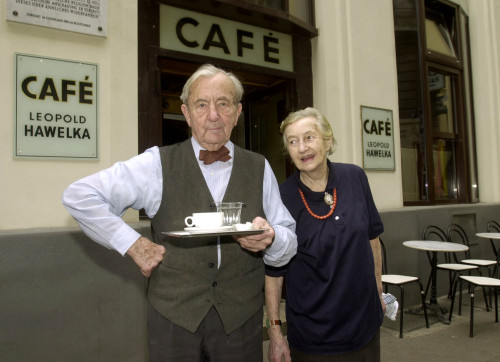VIENNA (AP) ― Andy Warhol stopped by for a cup of his coffee. So did princes, paupers, playwrights, poets and untold thousands for whom a visit to Vienna was unthinkable without a cup of steaming brew served by the bow-tied little man with the perpetual dancing smile.
In this city of more than 1,900 cafes, Leopold Hawelka was an icon, as much part of Cafe Hawelka as its tables ― scarred by burned-out cigarettes, their marble tops worn smooth by the elbows of four generations. He served tourists, the rich and the famous, and the neediest of the needy ― the ragged Viennese masses who crowded his establishment over a free glass of water to escape the cold of their bombed-out city after World War II.
Hawelka’s daughter, Herta, said he died in his sleep and “without pain’’ Thursday aged 100 ― leaving behind a legacy as intimately linked with the city as any of its splendid palaces or sumptuous art collections.
Cafe Hawelka was never posh. But while costly makeovers left other cafes soulless, Hawelka’s grew in charm with each layer of patina laid down over the more then 70 years of ungentrified existence that left it little changed from the bleak postwar days.
In this city of more than 1,900 cafes, Leopold Hawelka was an icon, as much part of Cafe Hawelka as its tables ― scarred by burned-out cigarettes, their marble tops worn smooth by the elbows of four generations. He served tourists, the rich and the famous, and the neediest of the needy ― the ragged Viennese masses who crowded his establishment over a free glass of water to escape the cold of their bombed-out city after World War II.
Hawelka’s daughter, Herta, said he died in his sleep and “without pain’’ Thursday aged 100 ― leaving behind a legacy as intimately linked with the city as any of its splendid palaces or sumptuous art collections.
Cafe Hawelka was never posh. But while costly makeovers left other cafes soulless, Hawelka’s grew in charm with each layer of patina laid down over the more then 70 years of ungentrified existence that left it little changed from the bleak postwar days.

Today ― as generations ago ― tuxedoed waiters flit around tables, precariously balancing countless Viennese coffee varieties and trademark yeast dumplings on silver trays. Wooden wall paneling is lovingly scarred by the initials of visitors and paintings exchanged for a cup of coffee by impoverished artists in the 1940s still hang on the walls.
Even the ashtrays survived Vienna’s no-smoking laws ― though staff put them out in recent years only when ordered to do so by Hawelka, keeping a sharp eye on things from a stuffed brocade couch in the back of his establishment.
Though his visits grew increasingly rare as he neared 100, Hawelka left no doubt who was in charge when he did drop by.
“He remains our director-general,’’ said grandson Michael Hawelka earlier this year. “Whenever he is here, he’s the boss.’’
It was this sense of tradition that made Cafe Hawelka special ― along with reminiscences from the unassuming owner and his late wife, Josefine. Some of their best stories stretched back to the immediate postwar years, when ― split into Soviet, United States, British and French zones ― Vienna was the place of intrigue reflected by the film classic “The Third Man.’’








![[Graphic News] More Koreans say they plan long-distance trips this year](http://res.heraldm.com/phpwas/restmb_idxmake.php?idx=644&simg=/content/image/2024/04/17/20240417050828_0.gif&u=)
![[KH Explains] Hyundai's full hybrid edge to pay off amid slow transition to pure EVs](http://res.heraldm.com/phpwas/restmb_idxmake.php?idx=644&simg=/content/image/2024/04/18/20240418050645_0.jpg&u=20240419100350)





![[From the Scene] Monks, Buddhists hail return of remains of Buddhas](http://res.heraldm.com/phpwas/restmb_idxmake.php?idx=652&simg=/content/image/2024/04/19/20240419050617_0.jpg&u=20240419175937)

![[KH Explains] Hyundai's full hybrid edge to pay off amid slow transition to pure EVs](http://res.heraldm.com/phpwas/restmb_idxmake.php?idx=652&simg=/content/image/2024/04/18/20240418050645_0.jpg&u=20240419100350)

![[Today’s K-pop] Illit drops debut single remix](http://res.heraldm.com/phpwas/restmb_idxmake.php?idx=642&simg=/content/image/2024/04/19/20240419050612_0.jpg&u=)